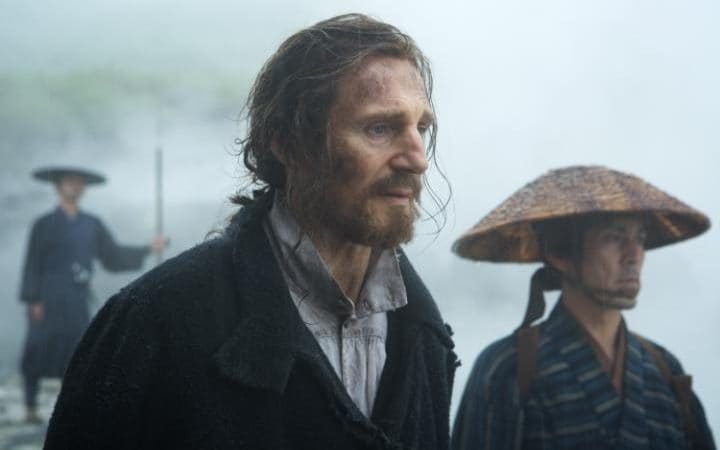
The faithful, just like most of us, love a good source of confirmation bias. Like the sensitive democrat and republican, they don’t want to question their beliefs. Reality must be what they choose it to be. Nobody wants the universe to be a mystery. Everybody wants to coast through life thinking they know enough about what lies between heaven and earth.
It’s unfortunate that many Christian films today are nothing more than this: a source of confirmation bias for its intended audience. Even worse is that these films are often extremely hateful. If they were imbued with a sort of Mr. Rogers sensibility, they would have been harmless fluff, perhaps even welcoming in these polemic times. But these films are reflections of years of propaganda and scaremongering from the charlatans aiming to gain their trust and votes. Their aim is to strike fear into the faithful, deluding them with the idea that their values are under attack. Scaring people can be extremely profitable.
The results are poorly-written propaganda pieces, such as the “God’s Not Dead” trilogy (though I have heard the third one isn’t as bad), “Left Behind,” or any cinematic abomination starring Kirk Cameron. On one hand, it’s easy to laugh at these films. At times they are hilarious in their shamelessness. But considering the immense profitability of these films, they are also tragic examples of how hatred has become commonplace in these circles and in American culture. It’s indicative of how successful their propaganda has become.
But there are some filmmakers who do respect and treat theological concepts with respect. They ask uncomfortable questions. They are modest about faith. They question the tenets. They don’t portray the religious as morally superior, because just like any human being of any faith or lack thereof, they are capable of both acts of terror and great kindness.
These films concern themselves with the human condition and what it means to have faith in our darkest moments. How faith can have value in our lives, but also how it can justify the worst sins imaginable. The hubris of certainty and the consequential warped conclusions about the mind the God.
Though all of these films concern themselves with the Christian faith, these films can apply to any person of faith as well. These are universal themes, for anyone wondering about their place in this world. They can, as the title of the article suggests, make you question your religion – and at the same time make it stronger.
These films examine the frailties and beauty of the faithful. How faith can be a source of comfort and meaning in our lives, as well as a source of terror. It’s these films, in their sincerity and openness, that have the ability to bring people together, both the faithful and the atheists. These films don’t give us easy answers, but that’s not what any religion should do. They represent the power of religion in a much greater way than many of the current Christian schlock propagated in modern cinema.
Religion might never have been divinely inspired, just another one of many foolishly man-made creations. Even so, these films prove to us that there can be value in faith, in these communities, in the illusion of a higher power. Despite the conniving preachers, the corrupt institutions, and manipulative politicians, religion can inspire the best of us – or at the very least, inspire 10 beautiful movies.
10. The Last Temptation of Christ
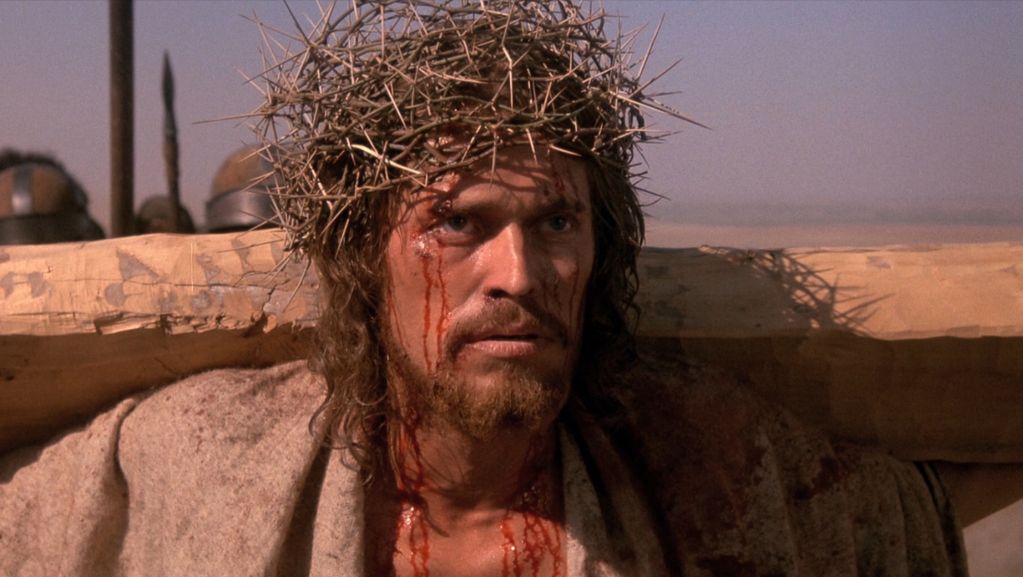
When “The Last Temptation of Christ” came out in 1988, a lot of Christians were outraged. Its original production company, Paramount, even passed on the film, partly due to budgetary concerns but also doubt about its commercial viability after receiving many protest letters from Christians. Director Martin Scorsese himself was concerned about how the initial film would be received. Even his own lawyer shared these concerns, stating that he wasn’t sure “whether the world was ready for it.”
On its release, the film was picketed and dissected by countless religious experts. It was banned in numerous countries and is currently still banned in Singapore and the Philippines. The outrage spawned numerous incidences of violence, most notably a bombing in a movie theater in France committed by the far-right group known as The Front National. When we speak about controversy now, it’s mostly manufactured by some hyped-up tweet or clickbait article. Usually the controversy is about nothing but people needing to talk about something. But “The Last Temptation of Christ” was, in every possible sense of the word, truly controversial.
In the most superficial viewing, it’s obvious why: Jesus being portrayed as a human instead of a superhumanly divine being, desiring carnal relations with Mary Magdalene. But the charges of blasphemy are also the result of ignorance over the differing interpretations of scripture. While various religious authorities condemned the film, their reasons had more to due with upholding their particular interpretation of the scripture and less to do with actual theological debate.
Based on Nikos Kazantzakis’ novel, the film depicts Christ at the crossroads of his destiny: should he lead a normal life, or should he sacrifice himself per God’s plan? In this way, Christ’s sacrifice becomes more spiritual; it’s as much an internal battle as it is physical. In this way, it makes his sacrifice more profound. If Jesus was a perfect superhuman specimen who accepted his fate without question, it would be less meaningful than a flawed human being who gave up his hopes and dreams in order to fulfill the promise of his life.
Like any man of faith, Scorsese even dares to question the truthfulness of the story. In the alternate timeline (or dream, whichever interpretation you fancy) where Jesus has become an old family man, Paul is still preaching about his death and resurrection. When Jesus confronts him about his lies, telling him that he is the messiah, Paul tells him the powerful truth: “You see, you don’t know how much people need God. You don’t know how happy He can make them. He can make them happy to do anything. Make them happy to die, and they’ll die, all for the sake of Christ. Jesus Christ. Jesus of Nazareth. The Son of God. The Messiah. Not you. Not for your sake. You know, I’m glad I met you. Because now I can forget all about you. My Jesus is much more important and much more powerful.”
We are all meant to be lost and we all need some sort of light to hold onto. The truth is that Jesus is most definitely not like we imagined him to be. But that’s the light we created for ourselves. Whether divinity inspired or a work of primitive of fiction, this is the light so many of us hold onto.
This is one of two films from Scorsese on this list. Scorsese had aspirations of becoming a priest himself, but turned to filmmaking instead. One could say he gave up his divine calling for his love of art, and perhaps this film could be perceived as his atonement for choosing a different lifestyle. At the same time, one wonders if he’s not doing a greater service to him as a filmmaker. As a piece of religious art, it’s far more profound than any preachings behind a pulpit. It’s not blasphemy – it’s actually most gracious.
9. Monty Python’s Life of Brian
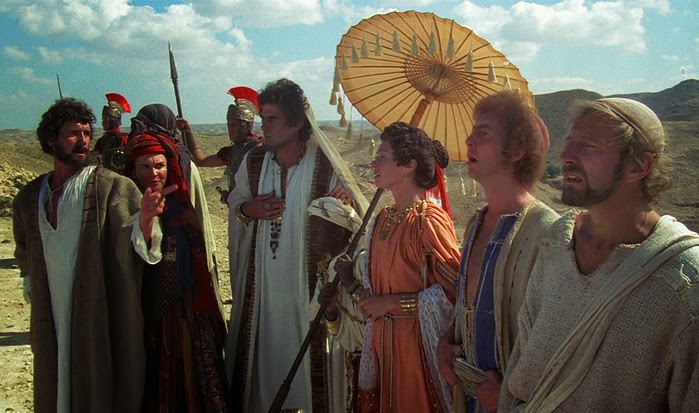
Another great and earnest film that was condemned by religious and moral authorities upon its release. Even though it mocks religious conformity and exposes the primitiveness of the first century, it’s actually never mean and condescending to the message of Christ. It satirizes religiosity and blind faith and the ensuing violent madness – or as John Cleese himself said in the infamous 1979 episode of “Fright Night” on BBC, it mocks “closed systems of thought.” If you want to see the outrage this film spawned upon its release and also want to have a good laugh, there’s certainly no better expression of this than that particular episode, which you can find on YouTube.
Richard Webster, who wrote the book “A History of Blasphemy,” admitted that the film was actually pretty mild in its offensive streak. It was more about the fear of what this film was about rather than what it actually was; as the film was banned in Norway, it inspired a hilarious poster tagline that said, “So funny it was banned in Norway!” Now that we’ve lived through the likes of “South Park,” it’s hard to imagine anyone really being offended by this – unless they make a version of this which includes the Prophet Muhammad.
As the title suggests, this film is about the life Brian (Graham Chapman), a normal man who is mistaken for the Messiah. Despite all his efforts to prove the contrary, his flock adamantly follows him and scrutinizes every one of his words – and is often the case with his religious followers, misunderstanding it to the point of insanity. Meanwhile, the Romans are cracking down on this annoying little religion that would become Christianity, and if Brian isn’t careful, he might become one of the subjects of this oppression…
As with all Python films, it’s ridiculous and silly and the six familiar Python faces take on multiple roles, but it’s Chapman as the film’s lead who truly impresses. He’s both hilarious but also necessarily human in his efforts in trying to lead a normal life. You can’t help but feel sorry for him – but you also can’t stop laughing at his suffering.
The finale, as all fans probably know, is even touching and philosophically insightful in the face of adversity and certain doom. It consists of multiple crucified men singing a song, celebrating the last bit of light that’s still around until all the world goes dark. No matter how old we get, the meaning of the song would forever ring true: “Always Look on the Bright Side of Life.”
I’m sure if Christ had known the lyrics, he would have sang it alongside his crucified fellowship.
8. Wise Blood
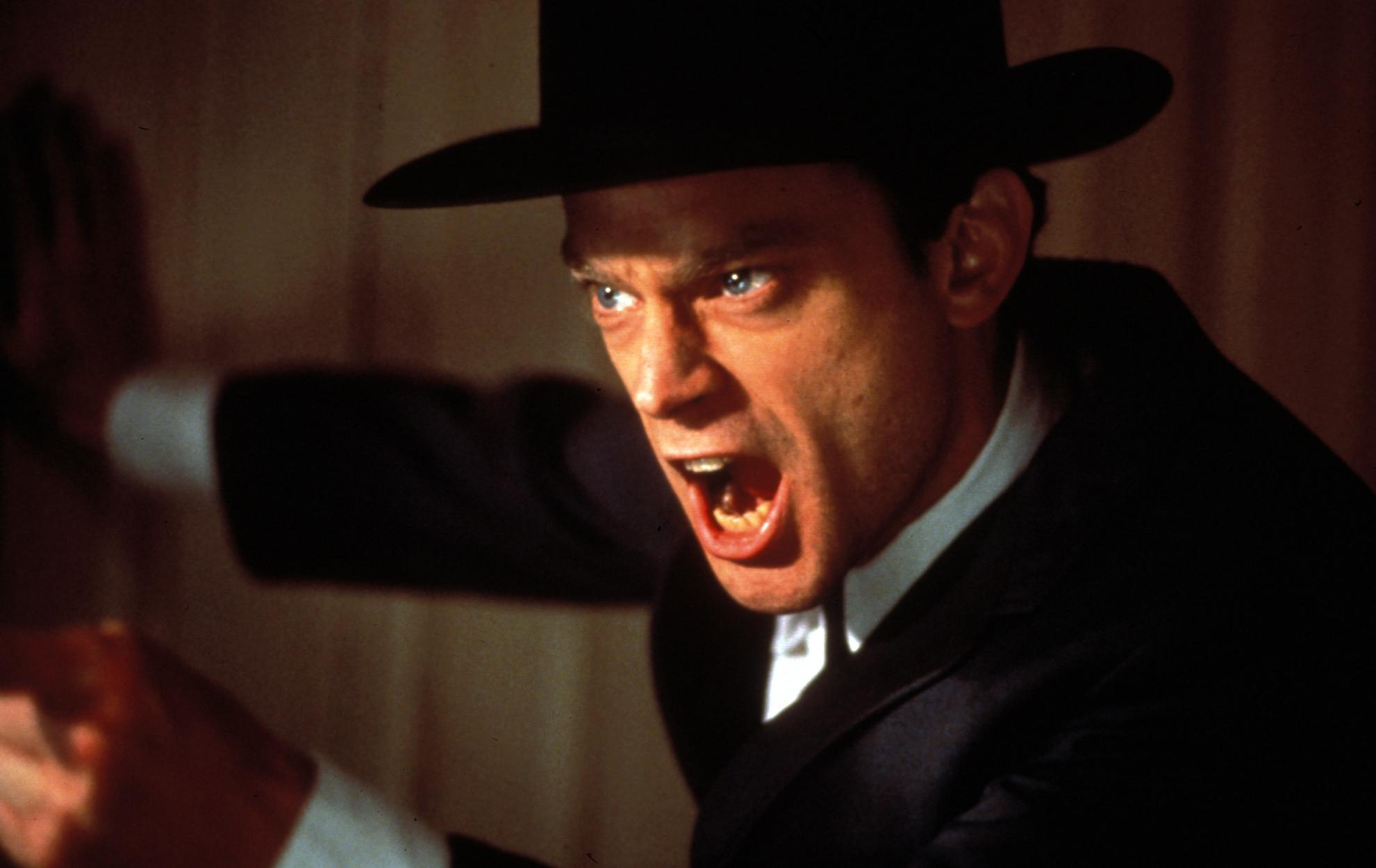
For a lot of preachers out there, religion is little more than a business. Surely they can forgive themselves easily after thieving the money from their parishioners, or perhaps tell themselves that their lies and hyperboles and greed are for a good cause: spreading the word, the influence of his will. We’ve seen plenty of examples of this and it’s still going on. From both leftist preachers and right-wing preachers – especially the ones who sold their soul to Trump, professing him to be exemplary for Christian values despite all evidence to the contrary.
In John Huston’s humorous “Wise Blood,” we are introduced those charlatan preachers – but not those who can afford private jets. These are the lowdown preachers, the ones on the streets and on the radio. This is all before they started to spread like wildfire in Reagan’s America. This is in the 1970s, in the deep South, where so many are lost and are aching to be found.
The film opens with Hazel Motes (a fresh-faced Brad Dourif in one of his rare leading roles), returning from military service to his old dilapidated childhood home. Remembering the abuse he endured from his preaching grandfather (played by director John Huston himself), he decides to start a different kind of church: The Church Without Christ. He travels to a nearby city by train, proclaiming to a fellow passenger that he’s “going to do things he ain’t never done before.”
When he finds the number of a prostitute on a bathroom wall, he hails a cap to take him there and the cab driver notes that he has the hat and face of a preacher. Hazel vigilantly proclaims that he doesn’t believe in anything. As he gets out on the right street, the cab driver notes, “That’s the problem with you preachers – you’ve all got too damn good to believe in anything.”
After he acquaints himself with the obese prostitute, he encounters a charlatan priest, Asa (the late great Harry Dean Stanton), who pretends to be blind, and his promiscuous daughter Sabbath (Amy Wright). Hazes creates Asa as his ultimate antagonist, a transference of his abusive grandfather. Hazel begins to preach on the street himself, disavowing any Christian notion such as salvation or redemption, where the subject of Christ must be replaced by a materialistic symbol, one made of flesh and blood.
As is often the case from those who want to expose myths and superstition, they fall prey to different myths and superstition. The philosopher John Gray, in his excellent book “The Seven Types of Atheists,” details the myriad of myths, mostly descendant from the Enlightenment, to which the atheist falls prey. One religion replaces the other. Instead of going to church or praying to God, people serve as corporate symbols and put their faith into humanism. The human mind has always been easy prey for delusion, no matter how ‘woke’ they think they are.
The one thing that differentiates Hazel from all the other preachers in town is his sincerity. While false preachers like Asa or radio preacher Hoover Shoates (a delightfully slimy Ned Beatty) are just in it for a quick buck, Hazel really wants to reach people and awaken them from their theocratic slumber.
In a place full of lost souls and false prophets, where religion has become a business and Christ has become merely a marketing tool, the atheist will come closer to salvation. In the end, after having dealt with so many fools and charlatans, Hazel blinds himself, throwing himself into the dark forever. He spends the last days of his life in pain, putting sharp rocks in his shoes and wrapping barbed wire around his belly.
When Hazel’s love-stricken landlady (Mary Nell Santacroce) offers him boarding and intimacy, under the condition that they get married, Hazel wordlessly puts on his coat and heads out the door. “The world’s an empty place,” his landlady tells him, pleading for him to stay. Hazel knows it’s an empty world out there and that no one but her will ever offer him this happiness and warmth. But he cannot let himself accept it – he feels he must suffer until his dying breath. So he heads out into the the precipitating cold, toward a certain death.
Whether he received some sort of redemption in the end is up for debate. At least he was aware of his transgressions and his need for atonement.
Ultimately, Hazel was a damaged soul. A victim of abuse from a parental figure who thought he was doing God’s work. People can do terrible things if they think they are an emissary of divinity. One might conclude that he was never an atheist to begin with. He was, without even realizing it, seeking to re-solidify his relationship with God, a relationship that was torn apart by his grandfather.
“Wise Blood” is a faithful adaptation of Flannery O’Connor’s novel, though the novel fills in many the blanks concerning character motivation and their background; I suggest reading the novel if you’re seeing the film. This film received little hype upon its release, but over the years has been rediscovered and received its rightful praise. It’s certainly one of the most underrated films from Huston.
It’s also a harsh but honest depiction of the loss and desperation surging through Southern Americana. A place where racial epithets are needlessly thrown around. Where people find and lose themselves. Where people with undiagnosed mental disorders are seeking God in the most unlikely places. It’s a place where wild blood runs wild.
7. Silence

Martin Scorsese had dreamt about adapting Shusaku Endo’s ponderous epic “Silence” ever since he read it in the early 1980s. Having had aspirations of priesthood, the novel spoke deeply to Marty – as described in a moving introduction he wrote for the novel. In this introduction, he confesses to having read the novel several times throughout his life: “It has given me a kind of sustenance that I have found in only a very few works of art.”
In my mind, “Silence” is essential watching for any Catholic or faithful person. It’s a film that can test your faith as well as solidify it. It asks the most painful question of all in the realms of faith: why is God silent in the face of suffering?
Taking place around the 17th century, Father Sebastian Rodrigues (intimately portrayed by Andrew Garfield), a pious Jesuit, is on a mission to discover the validity of the news that his mentor Father Ferreira (Liam Neeson) has apostatized during his mission in Feudal Japan, where Christianity has been outlawed. Together with the equally pious Father Garupe (Adam Driver), they secretly travel to Japan hoping to find him and prove the opposite. But the answer turns out to be far more horrifying than they could have imagined, and the existential questions that come with it will change them forever.
“Silence” portrays the atrocities of the Japanese government against Christians in unflinching terms, but it doesn’t just aim to condemn one side – it also asks tough questions on the side of the Jesuits as well. How righteous is their mission? Is it right for them proselytize their faith on these hapless and poor farmers? How can their religious authority be absolute when it can causes such immense suffering?
The question comes back to the viewer: what would you do? The answer seems clear but is it really? The answer might mean losing your soul for the greater good. But isn’t that what Jesus would have wanted? Or must we all suffer if we want to earn a place in his kingdom?
The answer might be a painful one. And so long as God is silent, we will never be sure. So all we have is faith. Even if we have to bury it inside us, will hold it closely to our hearts.
6. The Sunset Limited
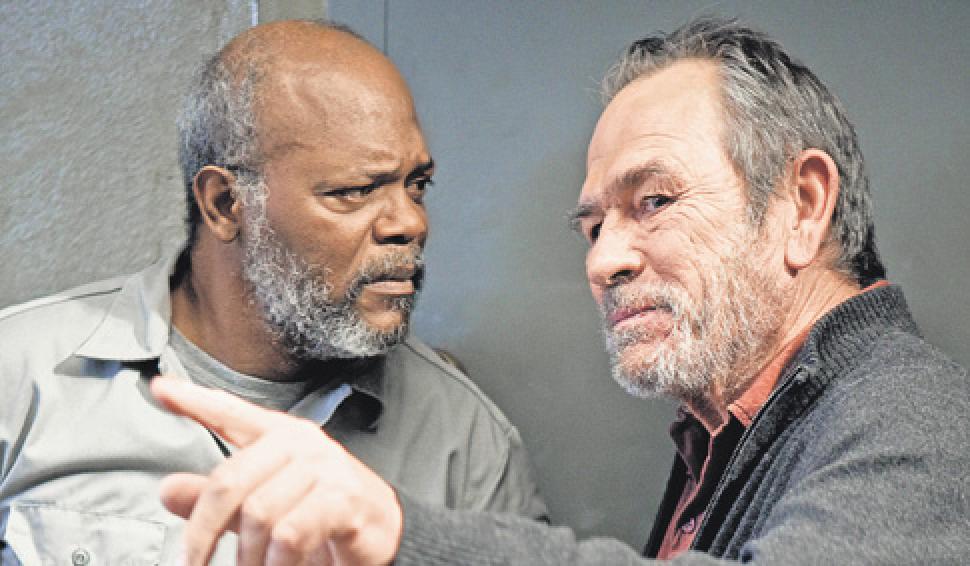
Out of all of Cormac McCarthy’s incredible literary work, “The Sunset Limited” will always be my favorite and this perfect adaptation by Tommy Lee Jones is largely to thank for this. Unlike McCarthy’s other notorious works, there’s no shocking violence, no grotesque display of wickedness. It just features two people talking about the often painful human condition. That’s it. A lot of people are probably already bored with this concept, but I personally adore it, especially when the words come from literary masterminds like McCarthy.
Though the theme of religion plays heavy throughout the narrative, “The Sunset Limited” is also about the need to find meaning in this world. At first, one might argue that the character of White (played by Jones) is your stereotypical atheist: an intellectual loner who, having rejected Christianity and faith, is forever doomed and lost. At the same time, you could also argue that Black (Samuel L. Jackson) is your typical Christian: a former criminal turned hypocritical Christian convert who uses religion to justify his past actions and enforce meaning upon his life.
Naturally, things aren’t quite so black and white. Both characters have their own personal complications, experiences that turned them from one meaning to another. The only difference is that Black seeks the light while White aches for the darkness. One rejects life while the other sees it as the most precious force of all. There’s hypocrisy and hubris on both sides. Sometimes I agree more with Black, other times more with White. It depends on the moment. Sometimes I want to believe Black while I know that deep down, White is right about nearly everything.
In their discourse, each side has a moment of victory and defeat, but there’s no winner in the end game. One could argue that White’s intellect prevails at the end and Black’s attempts to convert White towards his side, away from the Sunset Limited, has failed. When Black cries out to God at the end, asking him why he didn’t give him the right intellectual tools to sway White, there is no answer.
It’s possible that White is right, that all we are are hapless hosts in a godless universe, but perhaps Black sees something that White’s bleakness prevents him from seeing: the bigger picture, the thing that truly matters to the human mortal. By this logic, a little bit of a mental opiate might be necessary. It might make us appreciate the little time we have on this planet.
There might be no reward in the hereafter, but maybe that doesn’t matter. Maybe all what matters is that we inspire others to stay on the track and not take the Sunset Limited. There’s something to be said about people pretending to be angels. There’s something to be said about those who want to spread light upon this dark world.
This light, these feelings of transcendence are interpreted in a myriad of ways: oneness, God’s love, rebirth, enlightenment. It doesn’t matter how one interprets them. They are precious even if they are merely temporary – or illusionary, merely fluttering brain chemistry. Even White feels it during one of Black’s monologues, you can see it in his eyes. For a moment he’s pulled away from the void of his existence. If only he would listen a little while longer. If he did, he would know Black would be waiting for him the next time he’s seeking out the Sunset Limited.
He would always be there, always ready to take him into his arms were he to jump again. The Sunset Limited will come for all of us. Some even look forward to it. But it’s nice to know that we are not alone. That someone is out there, willing to change our minds.